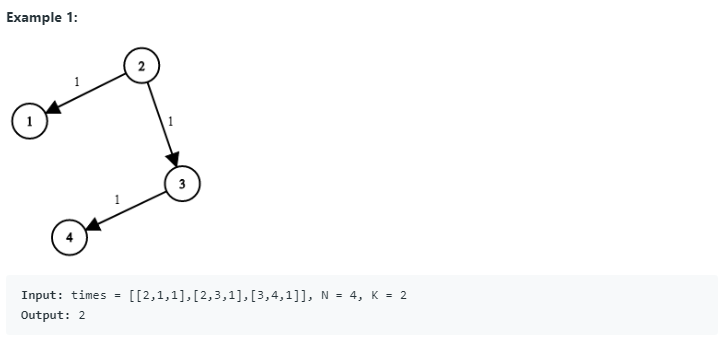https://leetcode.com/problems/network-delay-time/
There are N network nodes, labelled 1 to N.
Given times, a list of travel times as directed edges times[i] = (u, v, w), where u is the source node, v is the target node, and w is the time it takes for a signal to travel from source to target.
Now, we send a signal from a certain node K. How long will it take for all nodes to receive the signal? If it is impossible, return -1.
Note:
- N will be in the range [1, 100].
- K will be in the range [1, N]. The
- length of times will be in the range [1, 6000].
- All edges times[i] = (u, v, w) will have 1 <= u, v <= N and 0 <= w <= 100.
Please review for performance
[TestClass]
public class NetworkDelayTimeTest
{
[TestMethod]
public void ExampleTestBellmanFord()
{
int N = 4;
int K = 2;
int[][] times = { new[] { 2, 1, 1 }, new[] { 2, 3, 1 }, new[] { 3, 4, 1 } };
NetworkDelayTimeBellmanFord bellmanFord = new NetworkDelayTimeBellmanFord();
Assert.AreEqual(2, bellmanFord.NetworkDelayTime(times, N, K));
}
}
public class NetworkDelayTimeBellmanFord
{
public int NetworkDelayTime(int[][] times, int N, int K)
{
var dist = Enumerable.Repeat(int.MaxValue, N + 1).ToList();
dist[K] = 0;
for (int i = 0; i < N; i++)
{
foreach (var e in times)
{
int u = e[0];
int v = e[1];
int w = e[2];
if (dist[u] != int.MaxValue && dist[v] > dist[u] + w)
{
dist[v] = dist[u] + w;
}
}
}
int maxWait = 0;
for (int i = 1; i <= N; i++)
{
maxWait = Math.Max(maxWait, dist[i]);
}
if (maxWait == int.MaxValue)
{
return -1;
}
return maxWait;
}
}

